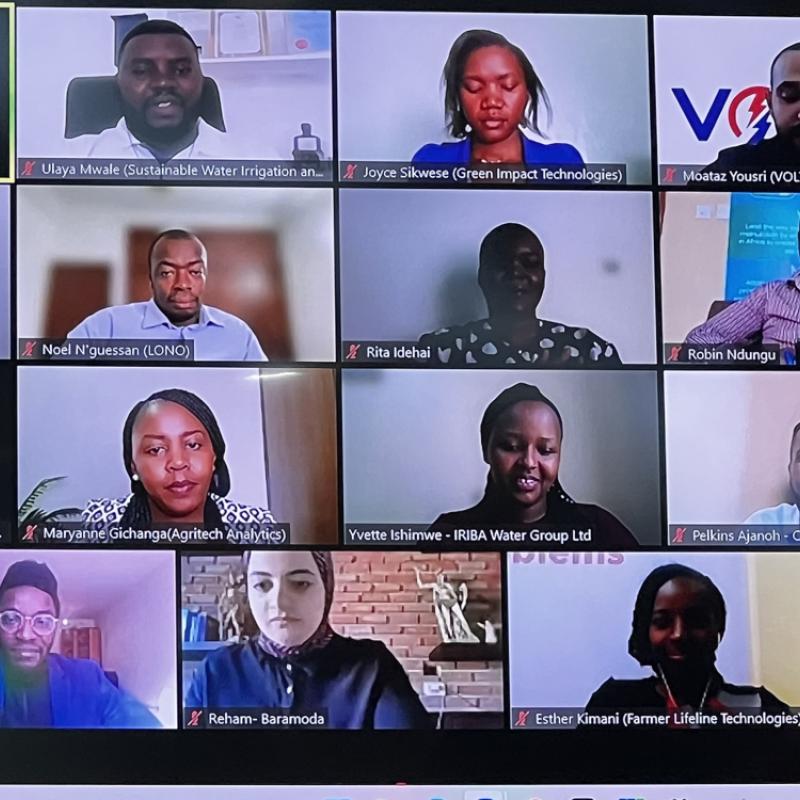
AAAP in the Media
Displaying 1 - 12 of 21
Can today’s Adaptation Action minimize future losses and damages in Africa?
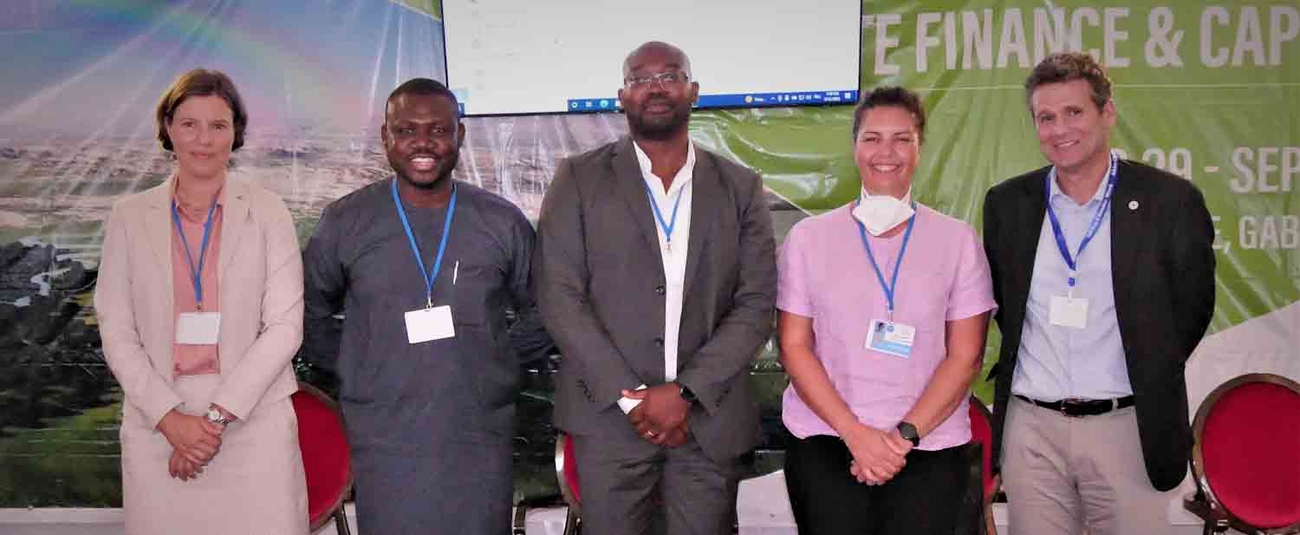
On the sidelines of the 2022 edition of Africa Climate Week(link is external), a session titled Limiting Loss and Damage through Enhanced Adaptation Action in Africa featured vibrant and timely discussion of an aspect of climate change that typically receives little attention: capturing and assessing the costs and damages associated with climate change.
The African Development Bank and Germany’s Konrad Adenauer Foundation hosted the event, which provided a forum for panelists and participants to discuss the importance of defining and evaluating such losses and damages of properties, economies, lives and livelihoods due to climate disasters. Africa is acknowledged to be the continent most vulnerable to climate change.
Moderator Olufunso Somorin, a Regional Principal Officer at the African Development Bank, opened the discussion. He pointed out that it is important for African countries to measure climate-change related loss and damage to enable appropriate quantification and well-designed responses best suited to country context. It was also important to capture those losses occurred even in instances where preventive climate adaptation actions had been taken, he added.
Fatten Agad, Africa Climate Foundation’s Senior Advisor on Climate Diplomacy and Geopolitics, called for production of a report that would serve as guidance and baseline for evaluating climate related losses and damage. “It has already been demonstrated that the socio-economic impact faced by African countries in coping with the Covid-19 crisis has been very high, and adding a burden of financing something such as loss and damage would be unfair,” she said.
Anja Beretta, Konrad Adenauer’s Director for Energy Security and Climate Change in Africa, urged African countries to integrate mechanisms to address losses and damage into their Nationally Determined Contributions (NDCs). She also called for designated institutions and functioning structures to ensure the efficient and effective use of climate finance to advance the discussion on financial flows into loss and damage.
Stephane Bonamy, Head of the Regional Delegation for the International Committee of the Red Cross in Cameroon, said, for countries that face both conflict and climate change impacts, it is imperative that preventive measures are put in place early enough to reduce the extent of loss and damage faced and lessen the burden on communities.” He noted that 14 of the 25 most vulnerable countries to climate change impacts worldwide also face some form of conflict.
Dr Olumide Abimbola, the Executive Director of the Africa Policy Research Institute in Berlin reiterated the need for more African examples of past and current loss and damage to be incorporated into textbooks and journals.
There was agreement among the participants on the need for Africa to prioritize timely, comprehensive and large-scale adaptation action to avert or minimize future losses and damages.
There was also consensus on the urgent need to scale up financial flows from public and private sources into adaptation action across Africa. They cited the African Development Bank’s Africa Adaptation Acceleration Program, a joint initiative with the Global Center on Adaptation, as a positive example. The program seeks to mobilize $25 billion over five years to accelerate and scale climate adaptation actions across the continent.
Participants also called for new strategic partnerships to drive adaptation policies, plans and investments in Africa through the implementation of NDCs and tapping synergies with such initiatives as the Africa Disaster Risk Financing program.
About the African Climate Week (ACW)
ACW is an annual event that engages and empowers stakeholders to drive climate action across countries, communities and economies. The event is organized by UN Climate Change in collaboration with global partners UN Development Programme, UN Environment Programme and the World Bank Group. Partners in the region include the Africa Union, the Africa Development Bank, the UN Economic Commission for Africa (UNECA). ACW 2022 was hosted in Gabon.
Africa Adaptation Dialogue: implementing the vision at the Africa Climate Week
What: Africa Adaptation Dialogue: implementing the vision
When: 31 August 09:30 - 10:30 CAT
Where: Libreville, Gabon
Who: Global Center on Adaptation; Africa Adaptation Initiative (Chaired by Gabon); African Development Bank
Despite contributing the least to global warming, Africa finds itself on the frontline of the climate emergency, with the impacts of external shocks exacerbating these vulnerabilities. Indeed, large portions of Africa—particularly the drylands that cover three-fifths of the continent—are warming at a rate twice the global average, putting half a billion people at risk.
Chaired by Gabon, the Africa Adaptation Initiative (AAI) aims to strengthen collaboration on adaptation across the continent. To implement this vision, the Global Center on Adaptation and the African Development Bank have jointly developed the Africa Adaptation Acceleration Program – AAAP. This Africa-led, Africa-owned response is mobilizing $25 billion for climate adaptation investments in the continent over five years. This event will review progress of the AAAP and how it is contributing to narrowing the finance gap, thus accelerating the implementation of AAI.
Program
- Welcome Remarks by the Moderator
Davinah Milenge Uwella – Principal Programme Coordinator, African Development Bank
- Opening Video
- Opening Remarks
Dr. Kevin Kariuki – Vice President, Power, Energy, Climate Change and Green Growth, AfDB
- Framing remarks: The Africa Adaptation Initiative and the AAA
Tanguy Gahouma-Bekale – Special Advisor to His Excellency Ali Bongo Ondimba, President of the Gabonese Republic, Permanent Secretary of the National Climate Council
- The AAAP as the vehicle to implement the AAI vision
Prof. Anthony Nyong – Senior Director, and Africa Regional Director, Global Center on Adaptation
AAAP voices from the field
- AAAP partners and beneficiaries
Moderated discussion with participants
- Wrap up by the Moderator
Multi-Stakeholder Dialogue on Climate Risk Assessment and adaptation options prioritization for the Transgabonaise road corridor PPP project
What: This is a private event
Where: Global - Virtual
When: 19 April 2023, 0:00
This first Multi-Stakeholder Climate Risk Dialogue will present the preliminary results of the high-resolution climate hazard modelling outcomes, and vulnerability assessment of the road corridor project.
Event description:
As part of the Global Center on Adaptation’s support to the Transgabonaise road corridor project under the Africa Adaptation Acceleration Program (AAAP), a Multi-Stakeholder Climate Risk Dialogue was organized to present results from the climate risk assessment with the African Development Bank, and project partners including the Societe Autiroutiere du Gabon (SAG), and the government of Gabon’s departments of Environment, Weather, and transport.
Historical weather trends, in Gabon, show an increase in mean annual temperatures of +1ºC since 1981, and decrease in mean annual rainfall, at an average rate of 3.8 mm per month per decade since 1960, with regional disparities. The technical assistance provided by the GCA will support an in-depth understanding of future climate hazards under different climate change scenarios, and across the different regions crossed by the 900km road corridor, and led to identify and provide a cost-benefit analysis of adaptation and resilience options to mitigate these current and future climate hazards.
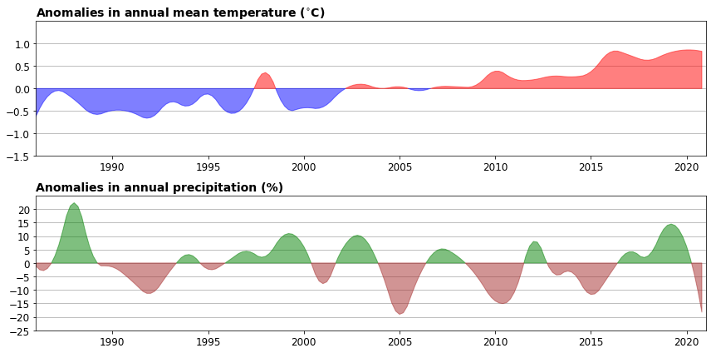
Figure 1: Climatology in Gabon: Historic evolution and trends, Source GCA – study from Royal Haskoning, Lobelia Earth, April 2023.
This First Multi-Stakeholder Climate Risk Dialogue will present the preliminary results of the high-resolution climate hazard modelling outcomes, and vulnerability assessment of the road corridor project. Especially, the project stakeholders will discuss the main climate hazards that have been highlighted, including extreme temperatures, extreme precipitation, drought intensity, and how these climate events might impact the assets and transport services. The discussion with local stakeholders will contribute to ensure robustness of the project outcomes.
Africa Adaptation Dialogue: implementing the vision
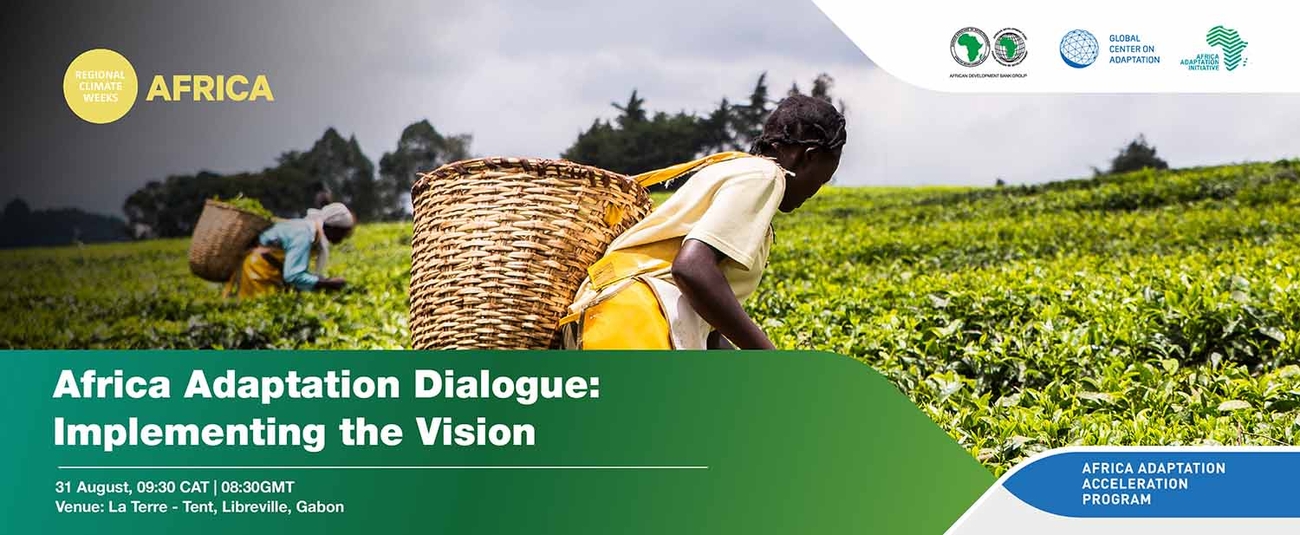
What: Africa Adaptation Dialogue: implementing the vision
When: 31 August 09:30 - 10:30 CAT
Where: Libreville, Gabon
Who: Global Center on Adaptation; Africa Adaptation Initiative (Chaired by Gabon); African Development Bank
Despite contributing the least to global warming, Africa finds itself on the frontline of the climate emergency, with the impacts of external shocks exacerbating these vulnerabilities. Indeed, large portions of Africa—particularly the drylands that cover three-fifths of the continent—are warming at a rate twice the global average, putting half a billion people at risk.
Chaired by Gabon, the Africa Adaptation Initiative (AAI) aims to strengthen collaboration on adaptation across the continent. To implement this vision, the Global Center on Adaptation and the African Development Bank have jointly developed the Africa Adaptation Acceleration Program – AAAP. This Africa-led, Africa-owned response is mobilizing $25 billion for climate adaptation investments in the continent over five years. This event will review progress of the AAAP and how it is contributing to narrowing the finance gap, thus accelerating the implementation of AAI.
Program
- Welcome Remarks by the Moderator
Davinah Milenge Uwella – Principal Programme Coordinator, African Development Bank
- Opening Video
- Opening Remarks
Dr. Kevin Kariuki – Vice President, Power, Energy, Climate Change and Green Growth, AfDB
- Framing remarks: The Africa Adaptation Initiative and the AAA
Tanguy Gahouma-Bekale – Special Advisor to His Excellency Ali Bongo Ondimba, President of the Gabonese Republic, Permanent Secretary of the National Climate Council
- The AAAP as the vehicle to implement the AAI vision
Prof. Anthony Nyong – Senior Director, and Africa Regional Director, Global Center on Adaptation
AAAP voices from the field
- AAAP partners and beneficiaries
Moderated discussion with participants
- Wrap up by the Moderator
Gabon –The Transgabonaise Road Project
With improvements to the road, rail, shipping and aviation networks a key government goal, Gabon’s transport sector is undergoing a major transformation. While population pressure is modest, with around 1.7m people in the country, existing links are limited; the two largest cities, Libreville and Port-Gentil, had, until work began on one recently, no road connection.
The 828 km long Transgabonaise road is key as it connects Libreville (the capital and coastal city) and Franceville (third Gabonese city after Port-Gentil). It comprises several segments of the Routes Nationales (RN) 1 to 4. Despite its strategic importance, the road has suffered from substantial deterioration due to a lack of maintenance and increased traffic over the last decade, caused by the increase of population and lumbering.
The projects is supporting the rehabilitation of a succession of national roads in Gabon to make it a more efficient logistics axis.
Transgabonaise Road Project is divided into three stages:
- Libreville -AlembéStage
- Alembé -Mikouyi (via Lalara, Koumameyong, Booué, Carrefour Leroy)
- Mikouyi -Franceville
- High-resolution, asset-level climate risk and vulnerability assessments to quantify key climate hazards and associated risks to the road infrastructure assets along the entire road corridor
- Innovative solutions for climate smart transport asset management: Based on specific hazards identified including nature-based solutions (NBS) to optimize the resilience of the assets
- Operational performance metrics and standards for the service level agreement (SLA) based on the direct and indirect climate-related damages identified
- Improvement in the capacity and quality of the road infrastructure
- Creation of over 1,000 direct jobs and over 9,000 indirect jobs
- Saving on operational costs and travel time impacting both households and private sector development though lower transport costs
- Generation of safety benefits and lower greenhouse gas emissions
- Additional 200 billion CFA (or $302.4 million) to Gabon’s GDP (equivalent to ~1.9% according to the 2021 GDP)
- Increased connectivity within Gabon and with neighboring countries such as Cameroon, Equatorial Guinea and Congo-Brazzaville
- Promote economic growth through ease of transportation of goods and services efficiently, allowing businesses to access larger markets and expand their operations
- increased trade, investment, and tourism, stimulating economic development in both urban and rural areas in Gabon
- Enhances regional integration and cooperation by facilitating the movement of people, goods, and services across borders, fostering trade relationships and cultural exchange
- Improve accessibility to remote areas, providing people with better opportunities for education, healthcare, employment, and social services
USD 99.2 million
Global Leaders Rally Support and Finance for the Africa Adaptation Acceleration Program to Tackle Climate Change in Africa
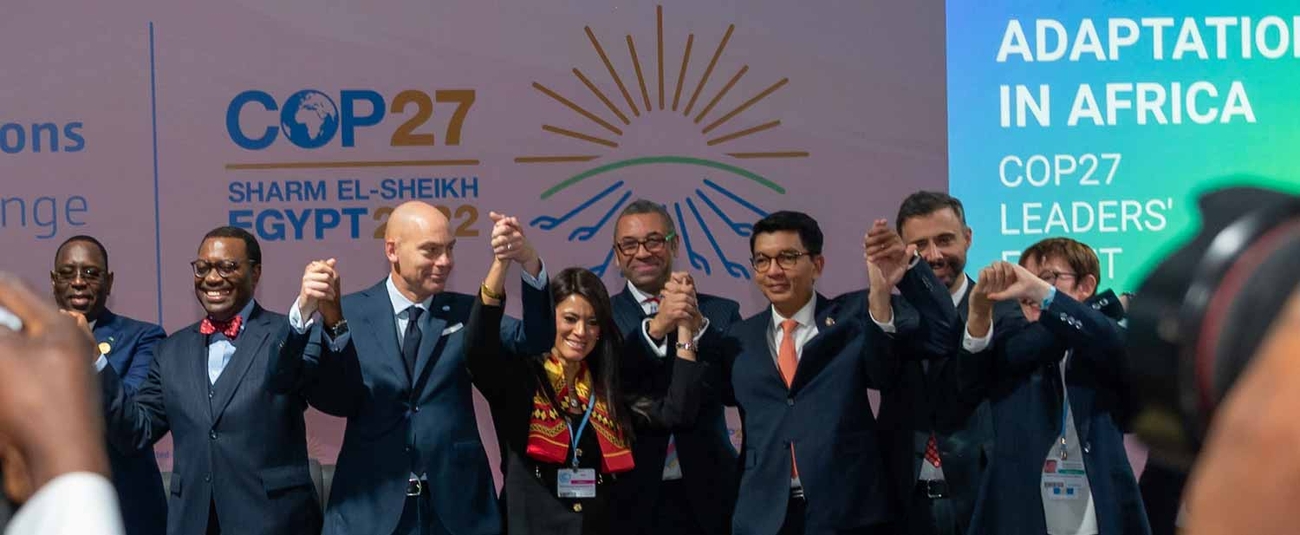
Global leaders on Tuesday rallied around climate adaptation for Africa. They attended the Africa Adaptation Leaders’ Event, convened by African Union Chair President Macky Sall of Senegal, Global Center on Adaptation CEO Patrick Verkooijen, and African Development Bank Group President Akinwumi Adesina.
The event took place at the global climate summit (COP27) in Sharm El-Sheikh, Egypt. It underscored the critical need for climate adaptation in Africa and responded to the call for the capitalization of the Africa Adaptation Acceleration Program (AAAP).
“This is a pivotal step in the fight against climate change,” African Union Chair President Macky Sall said. “The commitments made by Africa’s partners will give the Africa Adaptation Acceleration Program the boost that it needs to transform the development trajectory of the world’s most climate exposed continent. I am confident in the ability of the AAAP to deliver results for Africa.”
The Africa Adaptation Acceleration Program is an Africa-owned and Africa-led initiative developed by the Global Center on Adaptation (GCA) and the African Development Bank (AfDB) in close collaboration with the African Union. It serves as the implementation of the Africa Adaptation Initiative (AAI) to mobilize $25 billion to implement, scale and accelerate climate adaptation across the Africa. Since 2021, AAAP has mainstreamed climate adaptation in over$3.5 billion of investments in 19 countries.
United Nations Secretary-General António Guterres said: “I want to express my total solidarity for the Africa Adaptation Acceleration Program […] I urge the international community to support Africa to mobilize the technical & financial resources for scaling up transformative adaptation.”
“With this innovative program, Africa has developed a plan to grow, create jobs and opportunities for people, and to be resilient against the climate crisis,” said President Akufo-Addo of Ghana. “AAAP’s singular focus on the issue of climate adaptation will also contribute to greater stability and progress in Africa and around the world. AAAP is aligned with Ghana’s plans to address climate change as it chairs the Climate Vulnerability Forum (CVF) to lead efforts from the world’s most climate vulnerable countries to spur and mobilize investment through the Climate Prosperity Plans."
James Cleverly, Secretary of State for Foreign, Commonwealth and Development Affairs of the United Kingdom announced that the UK will provide £200 million to the African Development Bank’s Climate Action Window. This is in addition to the £20 million announced at COP26 in Glasgow to the AAAP Upstream Financing Facility.
Cleverly noted: “Climate change is having a devastating impact on countries in Sub-Saharan Africa facing drought and extreme weather patterns, which have historically received a tiny proportion of climate finance. This new mechanism […] will see vital funds delivered to those most affected by the impacts of climate change, much more quickly.”
Prime Minister Mark Rutte of the Netherlands followed through on the commitment made at the Africa Adaptation Summit held at the Global Center on Adaptation in September to confirm that the Netherlands will contribute EUR110 million to the AAAP, with EUR10 million in support for the Upstream Financing Facility hosted by GCA and EUR 100 million for the Climate Action Window of the African Development Fund at the African Development Bank as part of the Netherlands’ commitment to dedicate half of its climate funding, fully grant based, to climate adaptation, with a focus on Africa.
Norwegian Prime Minister Jonas Gahr Støre echoed African leaders’ calls for countries to rapidly scale up finance for climate adaptation, stating: “The climate crisis is here and now. Years of progress are at risk.”
“The AAAP Upstream Financing Facility is the delivery mechanism of adaptation and will use millions to leverage the billions that is required for adaptation,” he continued. “AAAP projects will generate effective climate adaptation outcomes. Adaptation is a growth agenda. A jobs agenda. And a prosperity agenda. On behalf of Norway, I am looking forward to continuing this partnership, investing in it, and supporting it with the Global Center on Adaptation.”
International Monetary Fund Managing Director Kristalina Georgieva emphasized the need to accelerate adaptation in Africa, stating: “It is paramount to support Africa’s adaptation because Africa will not reach its tremendous potential without it. AAAP complements the IMF’s Resilience and Sustainability Trust, which helps countries address external shocks such as climate change and ensure sustainable growth that can give Africa a chance to leapfrog outdated development models.”
African Development Bank Group President Dr. Akinwumi Adesina said: “Africa is suffering from the devastating effects of climate change. Our continent is being short changed by climate finance. The contributions towards the Africa Adaptation Acceleration Program’s Upstream Financing Facility and the Climate Action Window – which the African Development Bank manages – will help capitalize the program. With increased capital, we can better deliver the investment needed to bridge the adaptation finance gap. We want to ensure that the most vulnerable communities can benefit from a sustainable and prosperous future.”
Endorsing the outcomes of the high-level meeting, Patrick Verkooijen, CEO of the Global Center on Adaptation, closed with a statement emphasizing the AAAP’s impact to date, noting that “there is no pause button on the climate crisis. Africa must adapt to the threat of climate change, and it must adapt now.”
“Through the AAAP,” he continued, “Africa has charted its path towards a climate-resilient future for its youth, its economic growth, and for its prosperity.”
About the Global Center on Adaptation
The Global Center on Adaptation (GCA) is an international organization which works as a solutions broker to accelerate action and support for adaptation solutions, from the international to the local, in partnership with the public and private sector, to ensure we learn from each other and work together for a climate-resilient future. Founded in 2018, GCA is hosted by the Netherlands, working from its headquarters in Rotterdam with a knowledge and research hub based in Groningen. GCA has a worldwide network of regional offices in Abidjan, Côte d’Ivoire, Dhaka, Bangladesh and Beijing, China. Through this evolving network of offices and global and regional GCA teams, the organization engages in high-level policy activities, new research contributions, communications, and technical assistance to governments and the private sector.
About the African Development Bank
The African Development Bank Group is Africa’s premier development organization. Its overarching objective is to spur sustainable economic development and social progress in its regional member countries, thus contributing to poverty reduction across the continent.
The Bank Group achieves this objective by mobilizing and allocating resources for investment in African countries and providing policy advice and technical assistance to support development efforts.
In 2015, all multilateral development institutions agreed on the same set of objectives, the United Nations Sustainable Development Goals.
Learn more: https://www.afdb.org/
About the Africa Adaptation Acceleration Program
The Africa Adaptation Acceleration Program (AAAP) is a joint initiative of the African Development Bank and the Global Center on Adaptation (GCA). It aims to mobilize $25 billion, over five years, to accelerate and scale climate adaptation action across the continent. This ambition is delivered through the AAAP Upstream Financing Facility managed by the Global Center on Adaptation and the African Development Bank’s climate action window in the ADF replenishment. AAAP works across four pillars to achieve transformational results: Climate-Smart Digital Technologies for Agriculture and Food Security; African Infrastructure Resilience Accelerator; Youth Empowerment for Entrepreneurship and Job Creation in Climate Adaptation and Resilience and Innovative Financial Initiatives for Africa. AAAP has already guided over $3.5 billion of upstream investments in 19 countries with every dollar spent influencing $100 downstream.
COP27 - COP27 Leaders' Event, Accelerating Adaptation in Africa (DAY 2)
Africa Adaptation Acceleration Program showcases African youths driving climate innovation
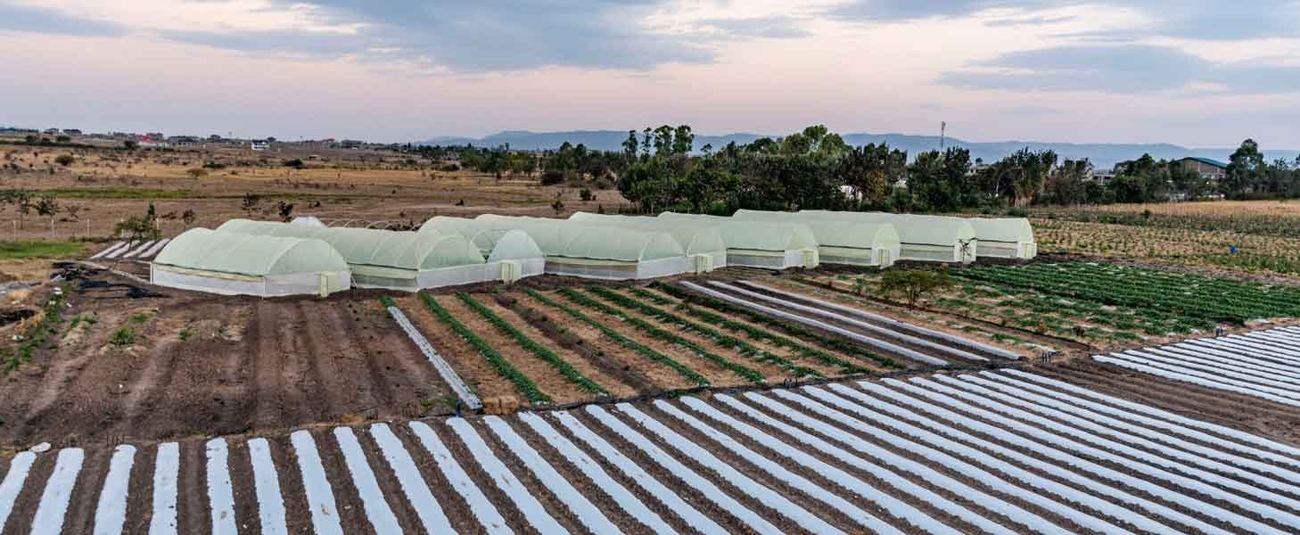
The Africa Adaptation Acceleration program (AAAP) – a joint initiative of the African Development Bank and the Global Center on Adaptation – recently showcased its initiative to harness the dynamism and leadership of Africa’s youth to drive climate adaption innovation.
On the side-lines of the recent 3rd Gobeshona Global Conference(link is external), AAAP brought together participants in its YouthADAPT program to share their experiences with the program as well as strategies to scale up youth-led approaches to adaptation
In his opening remarks, Dr. Kevin Kariuki, African Development Bank Vice President for Power, Energy, and Climate & Green Growth underscored young people’s integral role in Africa’s sustainable development.
“Youth form the backbone of Africa’s population, constituting over 60% of the population. The continent’s sustainable development hinges on harnessing this demographic dividend,” Kariuki said. “The AAAP, through its YouthADAPT pillar, has so far supported 35 youth-led enterprises in 14 African countries with $3.5 million to drive climate actions in sectors such as agriculture, waste management, renewable energy, water and sanitation,” Kariuki added. YouthADAPT is one of AAAPs four pillars for accelerating climate adaptation.
Caroline Mukuhi Mwangi, founder of Kimplanter Seedling(link is external) and Nurseries Limited, said her company was already seeing the benefits of participation in the program. Kimplanter provides drought resistant seedlings that boost food production and food security in Kenya.
Mwangi said, “We have ventured into new markets in semi-arid regions and expanded our seedling varieties, increasing our revenue by 36% as a result of AAAP support. Our customer base has also grown from 8,000 to 16,000 farmers and we have increased our staff from 17 to 32, all of whom are women or youth.”
Aramide Abe, the Program Lead of Jobs for Youth & Entrepreneurship at the Global Center on Adaptation(link is external) confirmed that participating enterprises have already begun to show results. She said some have seen revenues rise by up to 50 percent. A fifth have ventured into new markets and have raised over $106,000 in additional funding from different sources.
Juveline Ngum, the founder of Bleaglee Waste Management Limited, a Cameroon-based start-up company using drone technology to tackle waste disposal, also stressed the benefits of participating in YouthADAPT.
“We have expanded our waste disposal management solution from west Cameroon into Douala, effectively using drones to detect clogged drainages and utilizing data for demand driven waste management,” Ngum said. Now, we aim to expand across national borders into Dakar, Senegal.”
Noël N'guessan’s Cote d’Ivoire-based company, LONO(link is external) – a winner of the 2022 YouthADAPT challenge – has patented technology for the production of organic fertilizer. The company has also introduced modular and mobile bio digesters for the agri-food sector. Biodigesters use microbes and other bacteria to break down organic waste including fat, greases, and even animal manure.
Still, Nguessan said challenges remained. “The cost of prototyping hardware equipment can be prohibitively high, resulting in lengthy project development cycles, “he said. He pointed to financial management training as vital for youth-led businesses.
The session also featured presentations by African Development Bank partners and other global organizations that have rolled out similar initiatives to YouthAdapt.
Sandra Simbiri, Program Specialist at UNICEF’s Generation Unlimited(link is external), said:
“Supporting entrepreneurs through STEM principles is key to preparing the young for technological innovations.”
Alfred Asiko, Senior Market Engagement Manager for the ClimateTech Programme at GSMA(link is external), a mobile technology association, said it has played a role in empowering youth to deploy such technologies as the Internet of Things, artificial intelligence and blockchain to tackle climate challenges.
“Through our innovation fund, we offer grants to climate startups, with a focus on supporting resilient solutions that utilize frontier technologies. We also provide skills development and training to help entrepreneurs succeed in scaling their innovations,” Asiko said.
He said that venture capital (VCs) firms had a critical role to play. ”We need to see more VCs stepping up and taking over from development finance institutions (DFIs) in providing financing and support to youth-led businesses,” he added.
YouthADAPT targets reaching 10, 000 African youth-led enterprises by 2025, promoting innovation and inclusive growth for young people in climate resilient jobs and through youth enterprise development. The AAAP’s other three pillars are Climate-Smart Digital Technologies for Agriculture and Food Security; the African Infrastructure Resilience Accelerator and the Innovative Financial Initiatives for Africa
The third annual Gobeshona Global Conference, organized by the International Centre for Climate Change and Development, took place virtually from 10-16 March 2023. It focused on monitoring Locally- Led Adaptation (LLA) and resilience.
African Development Bank and Global Center on Adaptation work with partners to enhance capacity to access climate adaptation funding
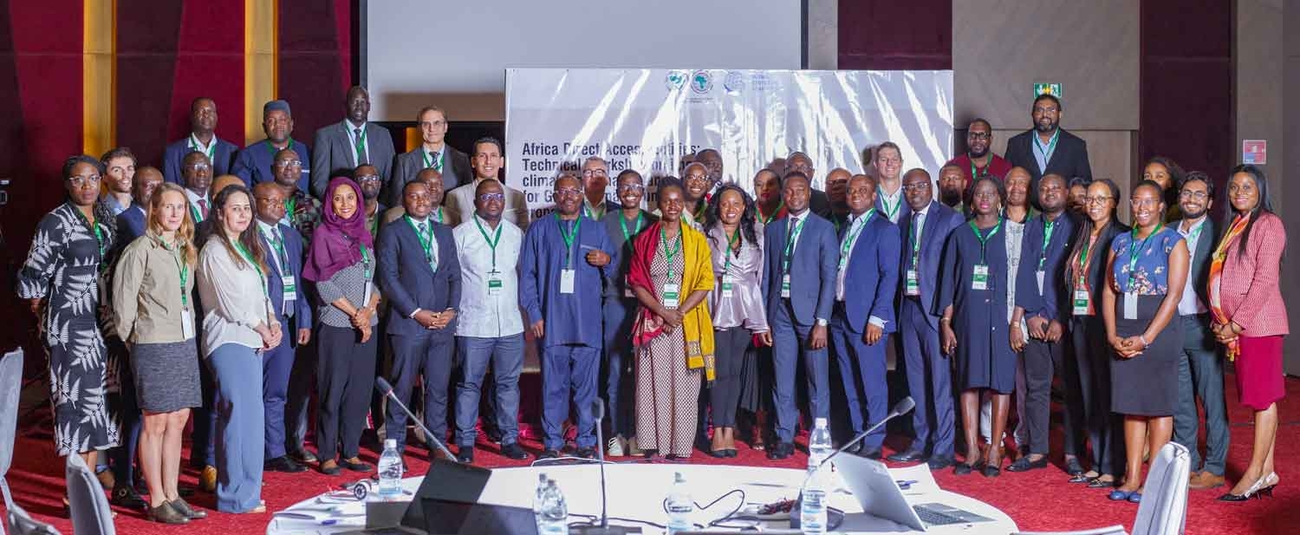
The African Development Bank and Global Center on Adaptation today launched a new initiative under the Technical Assistant Programme of the Africa Adaptation Acceleration Program(link is external) to help African countries access more climate adaptation funding.
A climate rationale is the scientific basis of a project and describes the climate change scenario, outlining the climate problem in a particular country (e.g., flooding, droughts for an adaptation project) and region that the project will be implemented in. The rigorous requirement by Green Climate Fund for climate rationale based on 30 years of point-source climate data has led to a high attrition rate for funding proposals with an adaptation focus.
Through this new initiative, Direct Access Entities in Africa will receive additional support to enhance their capacity with regards to climate data, tools, and methodologies that help them meet the critical requirements of climate rationale for compelling funding proposals that could merit approval by the GCF Board.
The GCF is one of the mechanisms of the United Nations Framework Convention on Climate Change to significantly contribute to the global efforts towards attaining the goals set by the international community to combat climate change. It supports developing countries to limit or reduce their greenhouse gas emissions and adapt to climate change impacts. For adaptation, it allocates resources based on: (i) the ability of a proposed activity to demonstrate its potential to adapt to the impacts of climate change by promoting sustainable development and a paradigm shift; (ii) the urgent and immediate needs of vulnerable countries, in particular, Least Developed Countries, Small Island Developing States and African States.
The African Development Bank and the Global Center on Adaptation will work with their partners to select at least four proposals each year based on the pipeline of Direct Access Entities funding proposals that require additional technical assistance and guidance. Through its Technical Assistance Programme (TAP), the Global Center on Adaptation will provide technical assistance for a selected set of funding proposals.
The launch event for the new initiative took place in Abidjan, Cote d’Ivoire, on the 6th and 7th of December with program partners including the Green Climate Fund (GCF), World Meteorological Organization (WMO), Africa Climate Change Fund, ClimDev Special Fund and Regional Climate Centers in Africa.
23 Direct Access Entities accredited or at the final stage of accreditation to GCF participated in the two-day event with representatives of regional and international accredited entities, including the Development Bank of Southern Africa, the International Fund for Agricultural Development, the West African Development Bank, the Africa Finance Corporation and the United Nations Environment Program.
In opening remarks,Professor Anthony O. Nyong, Senior Director for Africa at the Global Center on Adaptation said , “Africa is on the frontline of our climate emergency. Through this new initiative, we aim to significantly increase the flow of adaptation finance to the region. Given the central role of the Green Climate Fund, the unprecedented volumes of funding it offers, the range of financial instruments it provides, and its different access modalities, we will initially focus this initiative on accessing GCF resources, but this is just the start of our long-term partnership with African countries to mobilize finance for climate adaptation across the continent. »
Dr. Al Hamndou Dorsouma, Acting Director of the Department of Climate Change and Green Growth at the African Development Bank, said, “climate rationale for GCF funding proposal is like the foundation of a building. A solid building should have a solid foundation and I am glad our bank has forged the collaboration with relevant regional and international institutions to help direct access entities secure approvals for more funding proposals on adaptation with strong climate rationale.”
Dr. Kevin Horsburgh, Lead Climate Scientist representing GCF, noted, “To promote transformational projects and catalyze climate finance at scale, GCF follows a four-pronged approach: transformational planning; catalyzing innovation; de-risking high impact projects; and aligning finance with sustainable development. Each step needs the best available information to assist decision-making. The GCF is pleased to be working with the WMO to create the bridge between climate information and all those who need to use it, to improve access to climate finance.”
Amir Delju, Senior Scientific Officer with the World Meteorological Organization, said, “Effective and progressive response to the urgent threat of climate change should be based on ‘the best available scientific knowledge.’ We recognize that it is very challenging for least developed countries to meet this requirement. As an expert service provider, WMO will continue providing the full value cycle of climate services, from data to analysis, information production, interpretation of the findings, and expert advice.”
Contact:
- Romaric OLLO HIEN, Communication and External Relations Department, African Development Bank, email: media@afdb.org(link sends e-mail)
- Technical Contact: Timothy Afful-Koomson, GCF Coordinator, African Development Bank, email: t.afful-koomson@afdb.org(link sends e-mail)
- Technical Contact: Ali Haider, Senior Program Officer, Climate Finance, Global Center on Adaptation, email: ali.haider@gca.org(link sends e-mail)
Africa Climate Change Fund launches Women and Youth Entrepreneurship Project
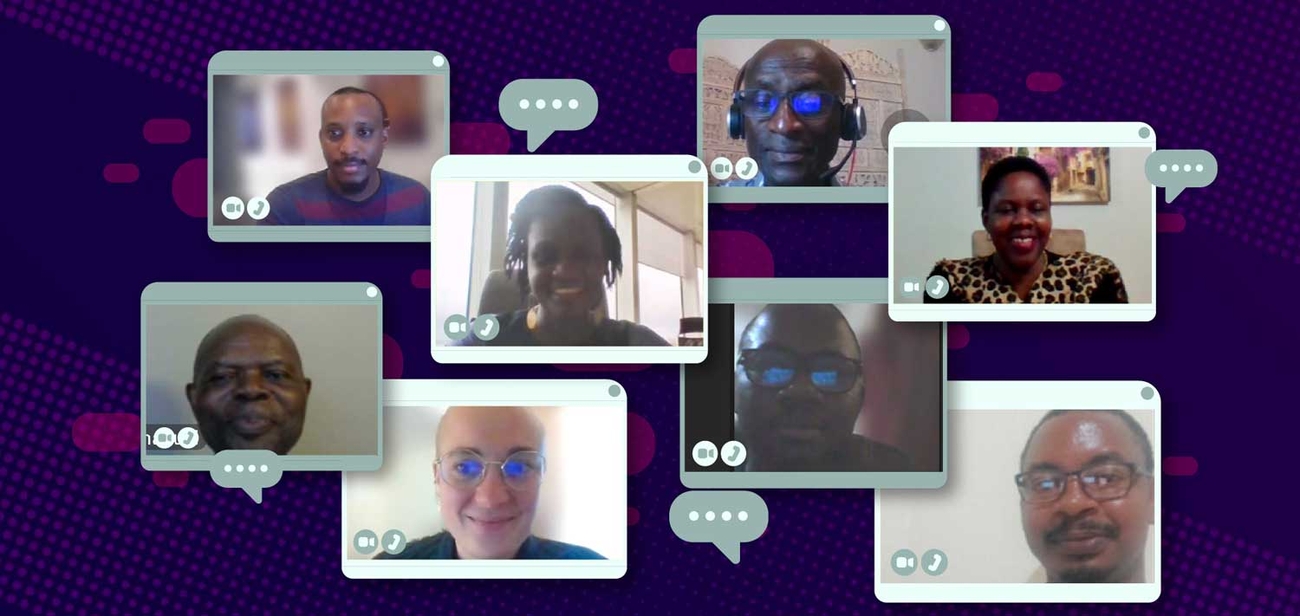
The Africa Climate Change Fund (ACCF) Secretariat has launched a scheme to support mechanisms for climate adaptation finance for women entrepreneurs and youth.
The scheme, “YouthADAPT: Empowering Women and Youth for Entrepreneurship and Job Creation in Climate Adaptation and Resilience,” will develop innovative, transformative climate-resilient bankable projects aligned with African countries’ Nationally Determined Contributions.
YouthADAPT is a flagship program under the Africa Adaptation Acceleration Program (AAAP), which is unlocking the untapped potential of youth in Africa to drive resilience and green enterprise.
The virtual launch followed the approval of a $1 million grant funding by the ACCF’s development partners for the project. The event rallied together stakeholders, including the project team, quality control, adaptation, gender, and communication experts, and climate change and green growth experts to share experiences.
ACCF Coordinator Rita Effah, and the Portfolio Officer, Lucy Debrion, explained the Fund’s operational guidelines on Bank-implemented projects.
AAAP Coordinator and Principal Climate Change Officer Edith Ofwona Adera said, "African youth are leading the way, not in talk, but in concrete climate action; as agents of change, innovators, and entrepreneurs.”
She said the scheme would support women-led local enterprises promoting adaptation solutions to create additional jobs.
Adera thanked the ACCF for collaborating on the projects. Adera also commended the Fund for its role in facilitating the production of proposals. “That makes our work easier,” she added.
Following the launch, the AAAP secretariat will regularly engage with the ACCF Secretariat on significant project milestones to ensure that the objective is fully accomplished.
Since 2017, the ACCF Governing Committees have approved 26 projects estimated at $15.87 million.
The AAAP will implement the project. For more information on ACCF and AAAP, please visit http://accf.afdb.org and www.afdb.org/aaap

